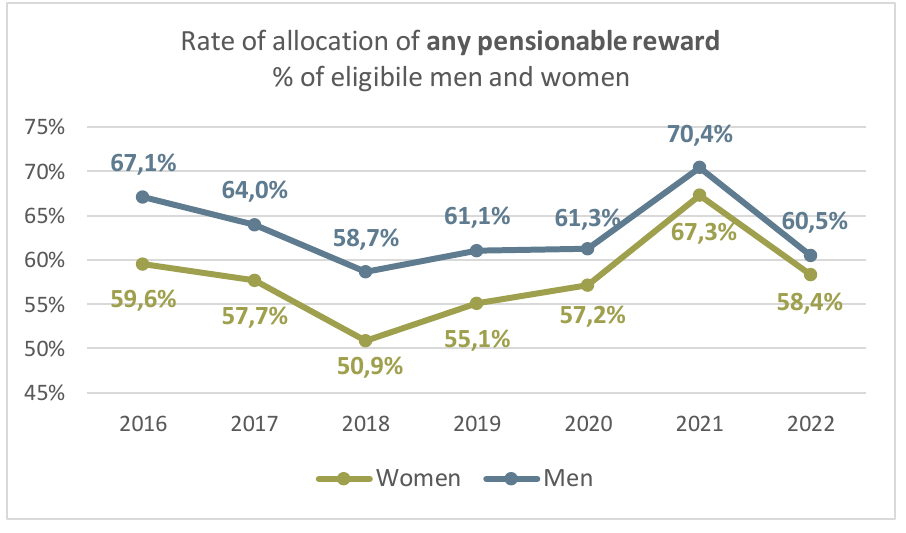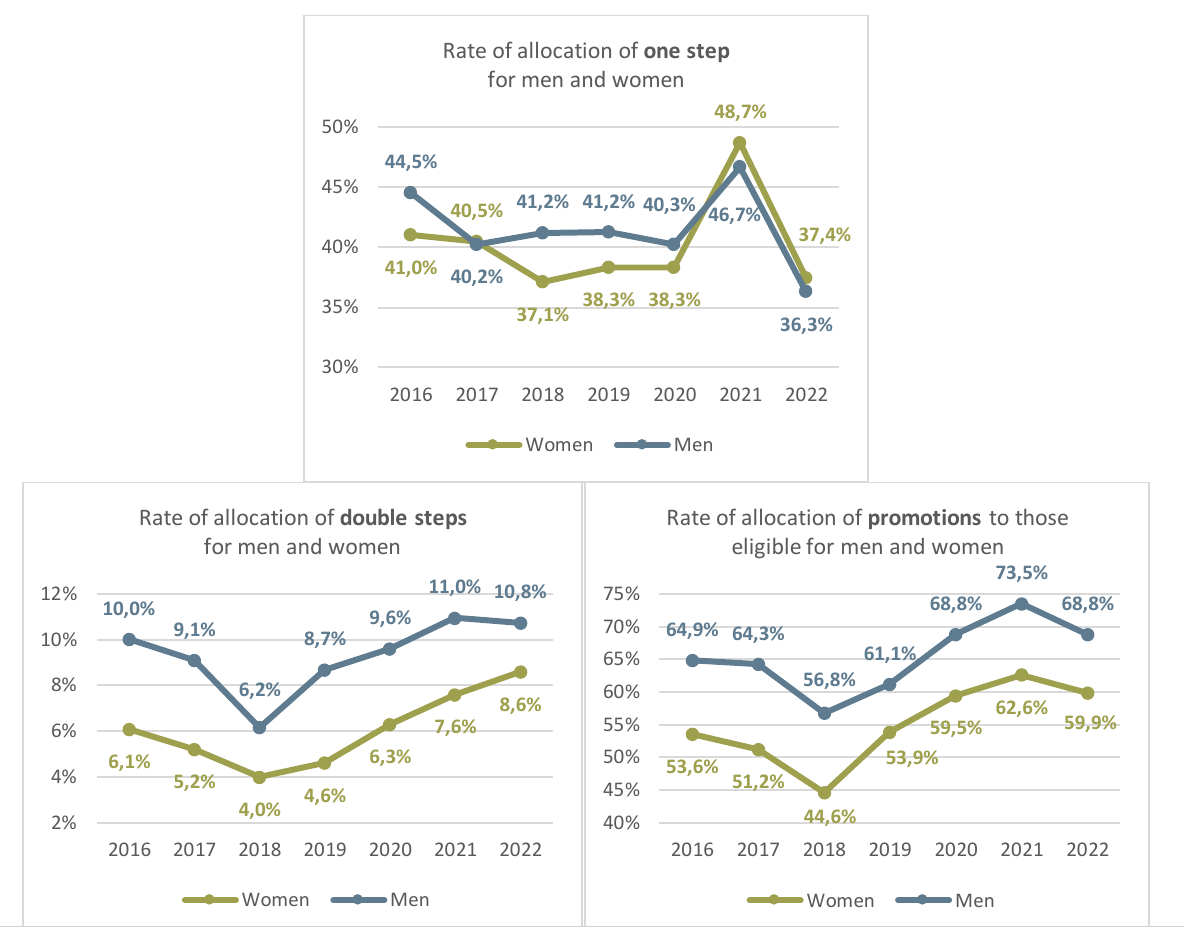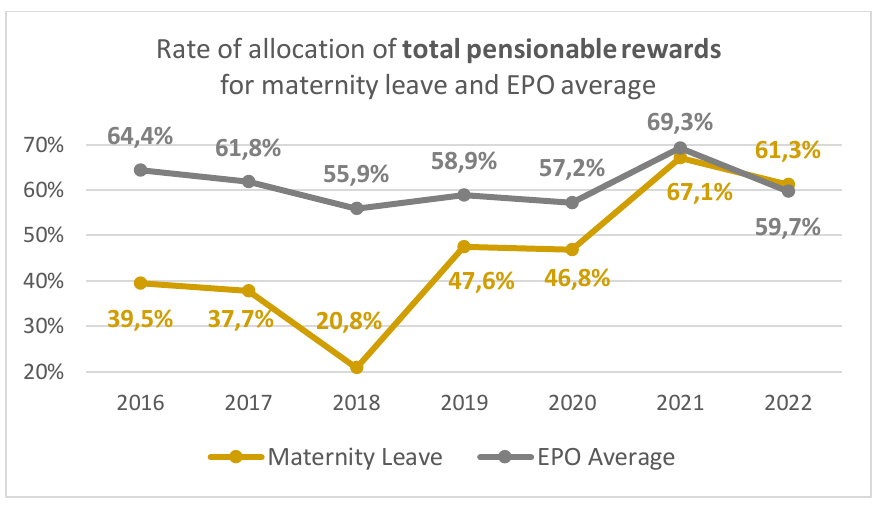
6a75e66c2e1b725c93741f0086aca5a7
EPO Exploits Women
Creative Commons Attribution-No Derivative Works 4.0
The Central Staff Committee of the European Patent Office (EPO) has circulated a new series about gender discrimination at the EPO. The staff union has long spoken about some aspects of this; now there are some solid numbers that support the allegations. Even the Administrative Council was concerned about this. Only hours ago the EPO's management boasted about (warning: epo.org link) the exploitative and likely illegal Pan-European Seal Programme, dubbing it "Nurturing next generation IP talent" and noting a female majority. The timing was interesting and it also said nothing about how grossly underpaid those people are.
"The EPO signals to women that they would be treated well (at least in public), whereas private data suggests otherwise."The female president of the EPO was muscled out by what she dubbed "alphamale" [1, 2] (Benoît Battistelli), followed by his corrupt successor, António Campinos, who mostly surrounds himself by friends, not qualified management.
It is expected that, especially as the next meeting of the Administrative Council fast approaches, there will be more publications on this topic. Here's the first message of more to come (the significance will become more apparent over time and is of interest to the public in general as the EPO isn't a private company, it just casually acts like one).
Rewards Exercise 2022: Overview and gender pay gap
Dear colleagues,
Every July the Office proudly announces the results of the yearly reward exercise. This year was no different, with the Office’s publication concerning the reward exercise of 2022 “Celebrating outstanding achievements with an inclusive approach”. In an effort to improve the transparency of the practice, the annual announcement is accompanied by a document containing the detailed statistics, which provide breakdowns of different divisions of our EPO population. We appreciate having access to the data, since it allows for an analysis of the distribution of the rewards despite being far from complete (i.e. lacking data on functional allowances).
The staff representation has carefully examined the data provided this year and for previous years and will make a short series of publications detailing our analysis:
Part one: Overview of the findings
Part two: Widening the Gender Pay Gap
Over the coming weeks, subsequent editions in this series on the rewards exercise will be published that take a closer look at a number of topics that have given us cause for concern.
Sincerely yours,
The Central Staff Committee
Zentraler Personalausschuss Central Staff Committee Le Comité Central du Personnel
Munich, 16/09/2022 sc22120cp
Rewards Exercise 2022:
Part 1 – Overview
Introduction Every July the Office proudly announces the results of the yearly reward exercise. This year was no different, with the Office’s publication concerning the reward exercise of 2022 “Celebrating outstanding achievements with an inclusive approach”. In an effort to improve the transparency of the practice, the annual announcement is accompanied by a document containing the detailed statistics, which provide breakdowns of different divisions of our EPO population. We appreciate having access to the data, since it allows for an analysis of the distribution of the rewards despite being far from complete (i.e. lacking data on functional allowances). Your staff representation has carefully examined the data provided this year and for previous years.
This paper is the first part in a short series of publications detailing our analysis. The present document gives an overview of our findings. Over the coming weeks, subsequent editions in this series on the rewards exercise will be published that take a closer look at a number of topics that have given us cause for concern.
Unequal treatment between men and women
"Women have received, on average, only 0.88 steps to every 1 step awarded to men"One of the most alarming issues that we have revealed is the difference in treatment between men and women, consistent through recent years. The Office claims that “the gender gap continued to close”, but this is a very naïve and misleading summary of the situation. In fact, the reward system is being used as a tool to increase the gender pay gap, and the cumulative effect is crippling. Our detailed analysis exposes the reality, that women are progressing more slowly in their careers due to the receiving only 0.88 steps for every step awarded to a man, are significantly less likely to receive a double step, and have to wait longer for a promotion.
"Men are 54% more likely to receive a double step compared to women"Further analysis will be presented in the coming publications that give details on other groups of staff including those who have been on maternity leave, recent recruits, part-time staff, and Job-Group-6 staff. These are all groups who have been under-rewarded in past periods and are yet to see any mitigating measures.
Decreasing the rewards budget"The budget set by the AC, in real terms is decreasing year on year"Regarding the budget allotted to the reward exercise, we found that the yearly budget for pensionable rewards is decreasing year on year, and does not keep up with inflation. Furthermore, the President sets his own budget which is always lower than that approved by the AC, and even then does not manage to spend the entirety of the lowered budget. The amount of budget which could have been used to reward staff is not negligible – it amounts to 18.88 million euros, which is enough to give one step to every eligible employee.
"The budget withheld from staff since 2015 is enough to give one step to every eligible employee"Transparent or opaque? Some of you may have seen our report on the feedback we received from our observer in the Harmonisation Committee, and will appreciate that there is plenty to be improved upon when it comes to “transparency” in the proceedings. If the systematic issues of discrimination are not being discussed by management behind the closed doors, we wonder what is happening there, and what exactly are they harmonising?
Conclusions Although in some areas there are signs of limited effort to reduce the unfairness, in other areas the problems remain and appear to not have even been identified by the administration. Furthermore, the impact of previous reward exercises cannot be ignored. It is incredibly saddening that the EPO is not able to treat its employees fairly when managerial discretion is introduced, and allows discrimination to grow. A genuine effort will be required in the upcoming rewards exercises if one ever wants to close the existing gaps.
As time goes by, the new career system continues to be a “winner-takes-all” system, with a small group progressing fast, and an increasingly large group that have seen their careers grinding to a halt, progressing ever slower. It proves itself to be anything but a merit-based system.
More to come! Watch this space for a more detailed analysis of specific aspects of the rewards exercises in the weeks to come.
Your Central Staff Committee
Zentraler Personalausschuss Central Staff Committee Le Comité Central du Personnel
Munich, 16/09/2022 sc22121cp
Rewards Exercise 2022:
Part 2 – Widening the Gender Pay Gap
Old vs New Career System Prior to 2015, the EPO was doing some things right in terms of gender pay equality – both men and women were subject to the same salary progression within a grade – automatic steps up to the end of a grade (bearing in mind that there also used to be 13 steps per grade in the old salary scales), with managerial discretion only applied for decisions on promotions to the next grade.
Since 2015, when the new career system came into force, managerial discretion is now applied for all decisions on salary progression – both steps and promotions. It is now clear that, once the possibility arose, management was not able to resist the temptation to discriminate against women. The statistics shown in the figure below undisputedly expose that the new career system has created a gender pay gap.

Women’s career progression is a fraction of the men’s The Office insists that its efforts made to close the gender gap in the reward distribution should be recognized. However, the damage has been done, and the new career system has resulted in women progressing slower through their careers, thus increasing the gender pay gap. In fact, over the last 7 years, women received only 0.88 steps for every step awarded to men. We cannot find any reason to celebrate the fact that our management continues to discriminate against women, albeit less than a few years ago, and we cannot understand why the Office drags its feet in correcting such evident discrimination.
A diverse and inclusive organisation? – Not where it pretends For many years, the Office has boasted of its achievements in diversity and inclusion, yet it has never managed to reward men and women equally, not even in a single year. Furthermore, if we look more closely at the data and separate the pensionable rewards into single step, double step, or promotion rewards then we see further problems. When looking at single step allocation (top graph below), the difference between men and women isn’t so stark – in some years women were even rewarded one step more often than men. However, for double step rewards and promotions (bottom two graphs below), women are systematically and consistently under-rewarded when compared to men. We find some very troubling statistics – men are 54% more likely to receive a double step than women, and men are 19% more likely to be promoted (when eligible) than women. Here, the Office has done nothing to address the issue, since the trend is stable.

The cumulative effect of this under-rewarding of women on the gender pay gap must not be underestimated, and this enduring bias is simply not worthy of an international organisation. The Office is also silent on any possible measures to correct the discrimination that has happened since the introduction of the New Career System – is this because they think that the system is fair and women deserve fewer rewards and lower pay?
Staff on maternity leave The Office also proclaims that it is making an effort to reward staff who have been on maternity leave. There, we see a significant improvement during the last two reward exercises. However, for the first six reward exercises, staff on maternity leave were rewarded significantly below average, as is readily evident from the data provided by the Office below.

Conclusions In order to correct the serious errors of the past, staff members who were disadvantaged in the reward exercises since 2015 should now be compensated for their slower careers in the previous years. Inaction in this situation constitutes an admission on the part of our management that their claimed dedication to diversity and inclusion, and closing the gender pay gap, is just a smoke screen. We invite our management to open discussions on potential resolutions to these systemic issues.
Your Central Staff Committee